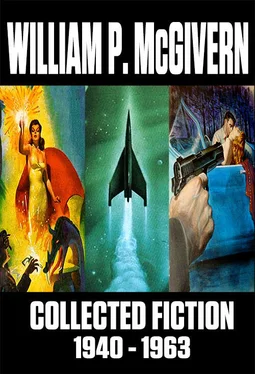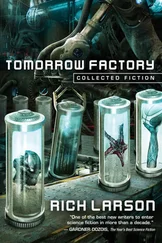Уильям Макгиверн - Collected Fiction - 1940-1963
Здесь есть возможность читать онлайн «Уильям Макгиверн - Collected Fiction - 1940-1963» весь текст электронной книги совершенно бесплатно (целиком полную версию без сокращений). В некоторых случаях можно слушать аудио, скачать через торрент в формате fb2 и присутствует краткое содержание. Год выпуска: 2014, Издательство: Jerry eBooks, Жанр: Ужасы и Мистика, Фантастика и фэнтези, Детектив, Прочие приключения, на английском языке. Описание произведения, (предисловие) а так же отзывы посетителей доступны на портале библиотеки ЛибКат.
- Название:Collected Fiction: 1940-1963
- Автор:
- Издательство:Jerry eBooks
- Жанр:
- Год:2014
- ISBN:нет данных
- Рейтинг книги:3 / 5. Голосов: 1
-
Избранное:Добавить в избранное
- Отзывы:
-
Ваша оценка:
- 60
- 1
- 2
- 3
- 4
- 5
Collected Fiction: 1940-1963: краткое содержание, описание и аннотация
Предлагаем к чтению аннотацию, описание, краткое содержание или предисловие (зависит от того, что написал сам автор книги «Collected Fiction: 1940-1963»). Если вы не нашли необходимую информацию о книге — напишите в комментариях, мы постараемся отыскать её.
Collected Fiction: 1940-1963 — читать онлайн бесплатно полную книгу (весь текст) целиком
Ниже представлен текст книги, разбитый по страницам. Система сохранения места последней прочитанной страницы, позволяет с удобством читать онлайн бесплатно книгу «Collected Fiction: 1940-1963», без необходимости каждый раз заново искать на чём Вы остановились. Поставьте закладку, и сможете в любой момент перейти на страницу, на которой закончили чтение.
Интервал:
Закладка:
With a last glance about him, Caesar slung his gold-laden cowl over his shoulder and set forth on his trip to Rome. It was a beautiful pearl-gray morning, warm and fragrant, with dew glistening on the shrubs and flowers that grew along the road. Caesar found it difficult to keep his face from mirroring the excitement and pleasure that throbbed within him. But that would never do, he reproved himself. He was a man of God, a humble servant of the Lord, and so he pulled down the corners of his mouth, put a profound frown on his forehead, and moved his lips as if he were praying. Thus, bent slightly under his load of gold, he hobbled along, frowning, preoccupied, and removed from the cares of the world. But, underneath that saintly facade, a high, giddy laugh beat soundlessly against the walls of his mind.
After walking for ten minutes Caesar encountered two raggedly dressed peasants. He saluted them gravely, and raised his hand in a blessing.
“In Nomine Patris —” he began, but the peasants, after one startled look, hurried past him and broke into a run.
Caesar stared after them, puzzled. What was the matter? Stupid bucolic idiots, he thought. Probably something on their consciences. A jug too much of wine last night, or some flirtation with a neighbor’s wife.
Ahead of him he heard the drumming beat of horses, and wheels striking the road with the sound of iron. He plodded on, smoothing the perplexity from his round bland face.
The sound grew in volume. Round a bend swept two chariots pulled by teams of spirited horses. There were soldiers in the chariots, rough, brutal-looking men in armor and metal headdresses. They reined their horses to a stop, and leaped to the ground when they saw Caesar.
He raised a hand in gentle greeting and put a soft smile on his lips.
“In Nomine Patris—”
A mailed fist struck him on the side of the face, and he went sprawling into the dust.
“Christian dog!” a voice bawled.
Caesar gasped as a metal-shod foot thudded into his ribs.
“You have the insolence to show yourself in the light, eh?” another voice cried.
“In the name of God, I am but a poor priest!” Caesar cried out, almost mad with anxiety.
Strong hands caught his arms, jerked him to his feet. His gold-laden cowl banged with a metallic crash against one of the soldiers’ breast place.
“What have we here?” a voice thundered.
Cloth ripped, and the golden bars clattered to the dusty road.
“Poor priest indeed!” the four soldiers cried in chorus, and they began to laugh. One of them drew back his fist. Caesar cringed, tried to break away, but the fist flew at him, crashed into his jaw with sickening force.
Another hand was on his shoulder, a gentle, soft hand.
“You must be strong,” a voice whispered.
Caesar raised his head slowly. There was a vast roaring in his ears. His jaw ached terribly.
“You must pray to our Savior for strength!” the voice said. “Core, raise your voice with mine. Oh! Almighty God...”
There was dust in his face, in his nostrils, and everywhere was noise. It beat in on him from all sides, a gay, roaring babble of sound.
He opened his eyes and began to shake. Around him, above him, on a I sides, faces peered down at him. Laughing faces, mocking faces, cruel faces, they lined the inside of a massive area. It was as if he lay imprisoned in wails made of human flesh, adorned and frescoed by grinning faces.
Caesar staggered to his feet and began to scream.
Hands pulled him to the earth. He was surrounded by a small group of calm, gentle men and women. “There is nothing to fear,” one of them said. “Good Friar, Our Savior will protect us!”
“I am a Christian!” Caesar screamed.
“We are all Christians. That is why we are here.”
“But they do not kill Christians now,” Caesar shouted. He struggled to his feet, and screamed at the crowd: “I am a Christian!” Their screams mocked his own, and a woman, a pretty woman, spat down into his face.
“Yes, they kill Christians,” the voice of one of the men said. “Since His death seventeen years ago. the rage of these god-haters has been unslakeable. We must pray for them...”
Caesar sank limply to his knees, and a flick of saliva appeared on his loose, slack lips. “No... no,” he said, in a voice under which trembled a high, mad laugh.
Seventeen years... This was Fifty A.D., not Three Hundred and Fifty. He had come back, in priest’s robe and rosary, into the most violent year of the Christian persecutions.
Now he understood, now he knew, what Kirkpatrick had done in the last frenzied moment while they fought in the door of the time machine. He had changed the instrument settings... He had sent Caesar back to Fifty A.D.
But it was still not too late, he thought with sudden wild hope. He was no Christian. He would tell them so, make them believe—
“Where am I?” he screamed, grabbing one of the calm, praying men at his side.
The eyes, brown, soft, kind, seemed puzzled. “You are in the Colosseum, brother.”
“No, no,” Caesar screamed.
Suddenly there was a new tone in the voice of the crowd. It was an exultant, ominous roar.
A sword flashed downward, chains rattled, and great doors were hauled away from tunnels leading to the pits.
Caesar began to run. He ran forward blindly, trying to make the slanted, pike-topped sides of the Colosseum. He heard the new noise, something other than the roar of the crowd, but he didn’t know what it was, didn’t realize what had happened or what was coming, until he turned his head.
And then he saw the animals and screamed for the last time.
I’ll Follow You to Hell
First published in the November 1952 issue of Fantastic Adventures .
Ryan was a copper of the old school. He had determination — and more. He’d trail a man into hell itself. But he found that the trip is usually made on a one-way ticket.
They brought him in about three in the morning, a slender, graying man with mild, bewildered eyes, and propped him against the counter of the Third Detective Division. One of the cops, a fresh-faced youngster named Wilson, called out, “Customer, gentlemen. Service please.”
A brooding waiting mood lay over the place — a night-mood that fitted in perfectly with tile dirt, cynicism, and basic hopelessness of a police station.
Cops, as a breed, are not the most cheerful people in the world. Their business the very nature of it — makes them pessimists. Night after night the lawless — the blank-eyed offenders — are brought in. And not one is ever guilty. They are all maltreated, imposed-upon citizens, and they’ll be the first to tell you so.
They tell the cops how badly they are abused and the cops listen with hard, stiff faces and then throw them into the tank until they can tell their stories to the judge and usually the judge finds that they themselves are the abusers — the abusers of the society which gives them aid and encouragement.
The good citizens do not see these offenders; the judge sees them but briefly. The police, however, are stuck with them in the interim; the police listen to their whinings and their lies. So the cynicism of the police can be understood.
There were three detectives, the night-shift, in the stale-smelling, dimly lit room. Two were sleeping, one on a wooden bench under the green-shaded windows, the other slumped down in a chair, a gray felt hat pulled down over his eyes. The third, a powerfully built man with reddish-brown hair, was awake, hunched over a report on his desk. This was Ryan, known as the toughest cop in the toughest district in Philadelphia. Ryan never napped on duty; he was always grimly, hopefully awake. Now he stood slowly, moving with the lazy grace of a confident animal, and strolled across the cigarette-littered floor to the counter. He was a tall broad man, solid as a slab of granite, with hard flat features, and eyes that were gray and deep and merciless.
Читать дальшеИнтервал:
Закладка:
Похожие книги на «Collected Fiction: 1940-1963»
Представляем Вашему вниманию похожие книги на «Collected Fiction: 1940-1963» списком для выбора. Мы отобрали схожую по названию и смыслу литературу в надежде предоставить читателям больше вариантов отыскать новые, интересные, ещё непрочитанные произведения.
Обсуждение, отзывы о книге «Collected Fiction: 1940-1963» и просто собственные мнения читателей. Оставьте ваши комментарии, напишите, что Вы думаете о произведении, его смысле или главных героях. Укажите что конкретно понравилось, а что нет, и почему Вы так считаете.

![Уильям Макгиверн - Завтра опять неизвестность [английский и русский параллельные тексты]](/books/35168/uilyam-makgivern-zavtra-opyat-neizvestnost-angli-thumb.webp)









